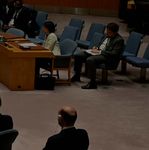A Climate for Change in the UNSC? Member States' Approaches to the Climate-Security Nexus
←
→
Page content transcription
If your browser does not render page correctly, please read the page content below
A Climate for Change in the UNSC?
Member States’ Approaches to the
Climate-Security Nexus
Traditional security actors and institutions facing complex socio-
ecological dynamics stand on the brink of change. Based on key
results of research on the UN Security Council (UNSC) and its
member states’ approaches to the climate-security nexus, this
Policy Brief recommends:
y That the UNSC formally recognize the complex interrelations of
climate change and security and their effects as a cross-cutting issue,
and adapt institutional working methods in order to comprehend the
challenges
y Improving dialogue within the UN by strengthening work capacity
and knowledge provision in the Climate Security Mechanism (CSM)1
and establishing a systematic forum for sharing lessons learned and
responses to the climate-security nexus between countries
y Establishing an international, interdisciplinary science network
05|20 JUDITH NORA HARDT | 2020IFSH – Institute for Peace Research and Security Policy at the University of Hamburg
The UNSC is the only institution with a mandate to maintain international peace and security. Since
its creation, it has primarily adopted a traditional defensive, reactive understanding of security fo-
cused on violent conflict, war and military activity. While the UNSC has dealt with broader security
topics (e.g. human security and the “Responsibility to Protect”) and included climate change’s ad-
verse impacts on stability in resolutions and mandates for field missions2, official recognition of the
multiple connections between climate change and other larger socio-ecological phenomena remains
overdue despite several initiatives to address climate change in the UNSC since 2007.
Within this context of scattered approaches and posi- were formulated on the basis of research focusing on
tions, the international collaborative research project state activities at the regional and international level
“Climate Change in the UNSC” (CLISEC UNSC) pro- and their corresponding positions in the UNSC.
vides, to date, the most systematic analysis of wheth-
er and how the 15 UNSC members (2020) approach APPROACHES TO THE
the climate-security nexus in domestic and interna- CLIMATE-SECURITY NEXUS
tional policies and practices. With a large internation- BY THE 15 UNSC MEMBER STATES
al network of interdisciplinary and country-special-
ized partner scientists, the analysis relies on a broad The assessment of government positions led to a key
spectrum of official primary sources from state gov- research result: All 15 member states acknowledge
ernments on policy (see table), various ministry strat- the climate-security nexus and have been doing so
egies (such as security strategies, military doctrines, to an increasing degree over the past few years in
policy frameworks and presidential orders), UNSC complex, changing, partly country-dependent ways.
documents, and interdisciplinary academic literature Following a comparative analysis, security approach-
on the climate-security nexus. It brings to light how es were divided into the three categories illustrated in
traditional security actors and other governmental en- the table below. The traditional security approach (I)
tities include and describe climate-security linkages is characterized by securing national and international
in basic policy frameworks and practices. The analy- security, ensuring peace and stability and responding
sis covers 2007 through April 2020, with a particular to violent conflict with military measures. The extend-
emphasis on recent events. Policy recommendations ed security approach (II) shares some concerns with
the traditional approach but also includes, for exam-
ple, climate change and extreme weather events as
threats to statehood and health. The existential secu-
“IT IS ESSENTIAL rity approach (III) understands climate change to be
part of broader socio-ecological phenomena and ex-
TO RECOGNIZE THE ceeding – in magnitude, scope and quality of threat –
INTERRELATIONS the current institutional contexts for existential threats
OF CLIMATE CHANGE to the future of humanity.
AND SECURITY
The table summarizes actors and views on the cli-
AND THEIR MULTIPLE mate-security nexus as identified in research on
EFFECTS.” UNSC member states.Policy Brief | A Climate for Change in the UNSC? Member States’ Approaches to the Climate-Security Nexus
Another key research finding is that all member states
except the Dominican Republic and Tunisia (where
no link was found), St. Vincent and the Grenadines
“URGENT
(which lacks a military) acknowledge the climate-se- INSTITUTIONAL,
curity nexus within the traditional security approach. MULTILATERAL,
Furthermore, all states include the climate-security SCIENTIFICALLY-
nexus within the extended security approach, and
several (e.g. China and South Africa) reference the
INFORMED CHANGE
existential security approach. IS NECESSARY
TO PROTECT
A third key finding is that the importance attributed INTERNATIONAL
to the climate-security nexus varies widely among
states. While some states (e.g. France, Germany
PEACE AND SECURITY.”
and the UK) place a relatively strong focus on the
climate-security nexus in their foreign policy, other
states (e.g. China, the Dominican Republic, Niger, The drive to include the climate-security nexus in
Russia and South Africa) refer to the nexus primarily the UNSC has evolved significantly over time. While
in domestic policy. Responses include mostly non- several member states have expressed concerns in
military, preventive and protective approaches such the past about militarization and potential misuse of
as climate change mainstreaming, institutionalization, climate change in power politics, in recent debates
scientific assessment, strategic or presidential policy during a meeting with external experts3 all 15 member
plans and frameworks, disaster risk management, states affirmed the necessity of improved information
humanitarian and development aid, and climate poli- on and scientific assessment of the linkages between
tics and diplomacy. security and climate change.
Three climate-security nexus approaches by the 15 UNSC member states
Approach I Traditional Security II Extended security III Existential security
Several ministries,
Military,
Actors e.g. the ministries of y Disaster Risk Management, y Health, y Environment,
Ministry of Defence, etc.
y Economics, y Foreign Affairs, y Domestic Affairs, etc.
Climate change is y interrelated with / y impacts on: Climate change itself is a
y conflict, terrorism, war and peace y threat to / y interrelated with /
y national security, international peace and stability y linked with multiple threats to /
a y challenge to:
Description y military forces, infrastructure, y vulnerability of sovereignty and
military activity statehood y poor and vulnerable population,
y social vulnerability, fragility and y livelihood and health of people states, regions
migration via socioeconomic and ecological y future generations
impact and extreme weather events y humanity
Source: Elaborated by the author on the basis of primary sources analysis in the context of the CLISEC UNSC project. See forthcom-
ing IFSH Research Report #005 “A Climate for Change in the UNSC? Member States’ Approaches to the Climate-Security Nexus” for
detailed research results.FURTHER RECOMMENDATIONS FOR y The building of case-by-case analyses of complex,
IMPROVING KNOWLEDGE OF THE dynamic, context-dependent connections between
CLIMATE CHANGE-SECURITY NEXUS the forms and socio-political roots of the climate-
security nexus in possible responses at the local
Scientific alarm concerning the ecological state of level. The accompanying scientific analysis should
planet Earth4 and complex, socio-ecological securi- include local experts and be informed by the disci-
ty threats and their impact on conflict and peace for plines of Peace and Conflict, Security Studies and
states, peoples, future generations and humanity as Earth System Sciences, among others.
a whole urgently demand institutional, multilateral
and scientifically-informed change. This Policy Brief y The development of proposals for specific institu-
strongly recommends establishing an international, tional adaptation and improved working methods.
interdisciplinary science hub/network that deals ex- A central goal should be developing preventive and
plicitly with questions in this ample research field and multilateral responses to protect essential condi-
provides knowledge to the UNSC, CSM, UN and the tions for life and the most vulnerable, thereby pro-
broader international community. The network’s as- tecting other core aspects of global security – the
sessments could provide the UNSC with a scientific environment and future generations – as already
basis for future decision-making, dialogue and bar- addressed in multiple member states’ constitu-
gaining concerning: tions.
ENDNOTES ABOUT THE AUTHOR ABOUT THE INSTITUTE
1
Established in 2018 as a joint initiative by the Judith Nora Hardt is postdoctoral researcher The Institute for Peace Research and Security
UN Department of Political Affairs, UN Envi- at the Institute for Peace Research and Secu- Policy (IFSH) researches the conditions for
ronment Program and the UN Development rity Policy at the University of Hamburg (IFSH) peace and security in Germany, Europe and
Program at UN HQ in New York. and the Centre Marc Bloch in Berlin. She is beyond. The IFSH conducts its research
2
See e.g. Resolution 2349 (2017); 2408 involved in the research group Climate Change independently. It is funded by the Free and
(2018); 2457 (2019) and e.g. field mission and Security (CLISEC) at the University of Hanseatic City of Hamburg.
mandates as MINUSMA; MINUSCA; UN- Hamburg and is active in the Scientists for Funded by:
OWAS; UNAMID. Future initiative.
3
UNSC (2020) Arria-Formula meeting on In cooperation with: Funded by:
climate and security risks, 22 April 2020.
4
IPCC (2019) Special report, In press; Lenton,
Universität Hamburg
T. M. et al. (2019) Climate tipping points. Too DER FORSCHUNG DER LEHRE DER BILDUNG
Research Group Climate Change and Security (CLISEC)
risky to bet against. Nature, 575(28), 592-595. Center for Earth System Research and Sustainability (CEN)
Copyright Cover Photo: AFP
Text License: Creative Commons CC-BY-ND (Attribution/NoDerivatives/4.0 International).
IFSH – Institute for Peace Research and Security Policy at the University of Hamburg
Beim Schlump 83 20144 Hamburg Germany Phone +49 40 866077- 0 ifsh@ifsh.de www.ifsh.deYou can also read

























































